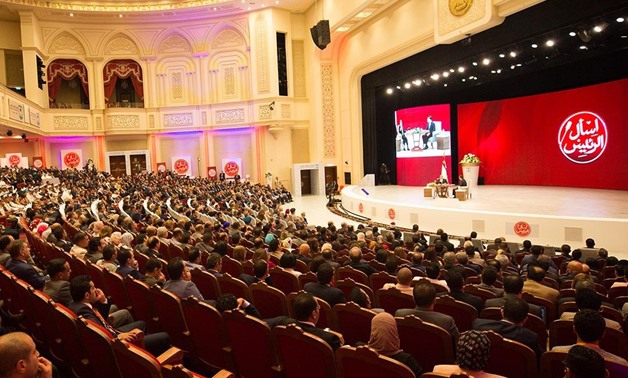
“Ask the President” session in the 8th National Youth Conference held in New Cairo’s Al Manara International Conference Center, Egypt. September 14, 2019. Press Photo
CAIRO - 14 September 2019: President Abdel Fatah al-Sisi answered questions on education and regional threats in “Ask the President” session, which is the third segment of the one-day 8th National Youth Conference held on Saturday in New Cairo’s Al Manara International Conference Center.
Answering questions on the ongoing reforms of the pre-university education system, President Sisi began by clarifying certain figures stating that Egypt has around 23 million students, more than 50,000 schools, and about 1.3 million teachers. The president said that the budget allocated to education is LE130 billion. Of which, 80 percent are paid as salaries.
“Education is an interactive subject matter so the public opinion has to be accepting the measures taken. Are people ready to cooperate to make the endeavor succeed,” the president questioned highlighting that the introduction of tablets is part of the reform program. “We can evaluate the experience only after 12 years and not at present where we are just at the beginning,” Sisi added.
“The process of shaping the mentality and character of the individual cannot be undertaken solely by the school whose role must be complemented by the mosque, church, media and family,” the head of state underlined.
“Real education produces an individual who would not be easily influenced by new media as they would have a critical mind... The past education systems did not encourage continuous self-development and high career ambitions. They produced individuals who just want to cover their families’ living expenses,” the president stressed.
Sisi suggested that technical education can absorb students who enroll in majors that give rise to the majority of the unemployed among high-education graduates. He also pointed out at the value of the Egyptian Knowledge Bank (EBK), which has made access to a great amount of knowledge possible for every citizen.
Shedding light on some features of the new system, the president said, “we work on the elimination of the human factor in the grading process. We need more fitness so we consider including gymnastics in the evaluation of students.”
“For terrorism or any conflicts in the region, the stability and unity of the Egyptian state is the real way to face any possible challenge,” the president asserted. He elaborated saying “terrorism is a very cheap method, economically and politically, for [terrorism] fostering states to undermine targeted states.”
“We need internal immunity. Terrorism is about infiltration and hiding. The remnants of defeated terrorist [guerilla] groups in the region are around 250,000 militants. Where will they go,” the president said.
“Terrorism is a long-term issue...Clerics do not realize the danger of misinterpretations and lies pertinent to religious teachings...Wrong acts like dumping trash on the streets and illegally constructing buildings are breaches to religious principles... I stress on the necessity to reform the religious discourse...Persuasion is key for individuals to take action,” the president said.
“The region is of great importance on the geo-political level...Pay attention to the amount of oil produced over the past 60 years and that will be produced in the future. That makes the region a target to many threats,” the president underlined. He added, “I do not exaggerate when I say that if Egypt collapses, the entire region will collapse.”
Commenting on the Grand Ethiopian Renaissance Dam (GERD) issue, “We continue in negotiations until the reservoir is filled in a way that suits us,” the president stated. “Before 1990, Iraq used to receive 100 billion cubic meters of water annually. Now it receives just 30 billion cubic meters. The strong is never stripped of their rights,” the president added hinting at the weakness of the neighboring country.
“We spend on the development of Sinai hundreds of millions of pounds...We borrowed a lot from Arab funds,” the president stated.
“ [The Micro, Small and Medium Enterprise Development Agency] MSMEDA works on creating job opportunities for youth...We need to boost the industrial sector...Imagine if we work on fulfilling all basic needs of 100 million people...Do not ask me about how we secured funding but about where it has gone,” the president said.
Replying to a question on how to deal with people who insult the state, the president said people have to educate their children about what happened in the aftermath of the January 25 Revolution that took place in 201. The president also highlighted that a person cannot be penalized unless breached the law.
“A brand new state will be built in the new capital,” the president affirmed saying that around 50,000 public employees will move to the New Administrative Capital (NAC) and that they will be using modern technology.
Among the achievements highlighted, the president cited that Egypt is no longer among the top countries in Hepatitis C infection. For the prospective garbage management system, the president said that the government is examining means to generate income that would cover the costs.
Sisi stated that the cleaning fees imposed on electricity bills are worth LE800 million per annum and that the amount is equivalent to a quarter of the budget needed to implement the new system.
The president concluded by addressing Egyptians and saying, “You should be wary to not be shaken by anything.”
The number of questions received by the National Youth Conference is 430,000. Of those, 23 percent are from Cairo, 11 percent from Alexandria, nine percent from Giza, and seven percent from Sharqeya.
Forty-seven percent and 28 percent of the questions are on social aspects and economic aspects, respectively. Twenty-three percent of the queries were put forward by women.
Thirty-two percent of questions were raised by people in the age group ranging between 31 and 39. Most of the questions were submitted by citizens working in the private sector. Forty-eight percent of questions were sent via social media while the rest was sent through traditional media.


Comments
Leave a Comment